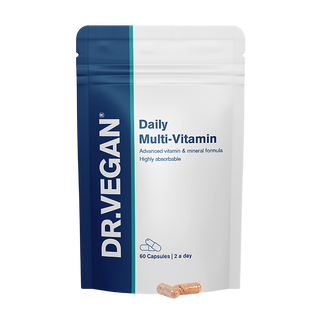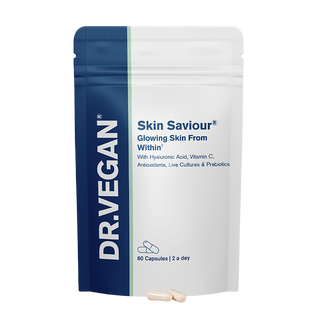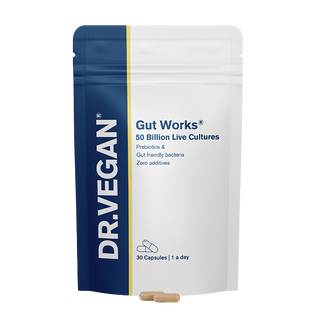Why Zinc is so important for your immune system, hair & skin

Zinc is an essential metal for the normal functioning of our immune system. If we don't have enough of it, either through our diet or a multivitamin supplement, the immune system does not function to its full capacity. We explain why Zinc is important, the signs of deficiency in zinc, which can cause health-related issues, and how to gain Zinc in your diet.
How does zinc influence the immune system?
Zinc affects multiple areas of our immune system, and is crucial for the normal development and function of cells that support our innate immunity, 'neutrophils' and NK ('Natural Killer') cells.
Immune cell function
Some immune cells rely directly on Zinc for their function, and when zinc is not consumed adequately through diet, it directly impairs our immune function. The immune cells which are affected are our 'Natural Killer' cells, 'macrophages' and 'phagocytes'.
What's your diet missing? Create your free Diet Profile.
B and T Lymphocytes
Lymphocytes are a form of small white blood cells, which are predominantly found in the lymphatic system, and are essential for helping your body wipe-out invading pathogens and creating antibodies. Zinc is needed for the regulation and maturation of lymphocytes, and an imbalance is indicated in autoimmune diseases. Learn more in 'Top 6 plant-based foods to support your immune system'.
Innate and adaptive immunity
'Innate immunity' is the immune system we are born with, while 'adaptive immunity' is the immunity that your body learns over time as you become exposed to infections. Both of these immune systems in our body require Zinc for their function. Read the science of staying infection-free by Immunologist Dr. Jenna Macciochi.
Antioxidant protection
Zinc works as an antioxidant scavenger, which means that it helps to balance the level of oxidation in the body. Keeping oxidation in balance is essential for the immune system, as some cells need antioxidants to protect them from their own toxins that are released when they come into contact with a pathogen (an organism that causes disease). Discover our 'Immune Boosting Ginger Tea' recipe.
Daily Multi-Vitamin

Cytokine production
'Cytokines' are the proteins produced by our body to instruct the immune system what to do. Our cytokine production relies directly on Zinc.
10 signs of zinc deficiency
Zinc deficiency may cause many symptoms. It is important to remember that a deficiency in Zinc, or inadequate consumption of Zinc, can occur a long time before symptoms of a deficiency may begin.
White marks on nails
White marks on our nails that are not related to trauma or superficial damage is one of the first symptoms of insufficient Zinc. It takes 6 months for your nails to grow out completely, so it’s worth keeping an eye on your nails to make sure no new marks near the cuticle are appearing.
Hair loss
Our hair is a rapid turn-over cell. This means it grows faster than many other types of cells on the body. As a result, it requires more Zinc than other parts of our body, and if your hair is thinning, or falling out, you should investigate your levels of Zinc, which can easily be done via a blood test. Hair Saviour® is a unique daily supplement to fuel hair growth, stronger hair and lustrous hair.
Results from Hair Saviour® Customer Lisa after 5 weeks of taking Hair Saviour®.
As zinc is also needed for hormone balance, hair thinning related to changes in hormone levels may also be a sign of inadequate Zinc intake.
Acne
Because Zinc is needed for the health and strength of our skin, our hormone balance and our immune system, a deficiency can result in acne. You may enjoy our nutritionists' blog 'How to get rid of acne'.
Skin Saviour®

PMS
Pre-menstrual syndrome (PMS) occurs primarily due to an imbalance of hormones during a woman's monthly cycle. A Zinc deficiency can result in unbalanced hormones, which may contribute towards symptoms of PMS. Discover what PMS type you are and the best foods for PMS.
Low testosterone levels
Zinc is required for the balance of testosterone in both men and women. Men with low testosterone may find they need more Zinc in their diet. Testosterone is also vitally important for women - learn more in 'Why is testosterone important for women?'.
Susceptibility to infections
As Zinc is so important for immune cells for function correctly, an inadequate intake my decrease their function, leading to more frequent infections or illness. You may be interested in reading more about signs your body is fighting an infection.
Loss appetite
Even a slight deficiency in zinc can cause reduced appetite.
Vision problems
Our eyes contain a high concentration of Zinc, and when levels of Zinc fall, our vision may be impaired. The most likely first symptom in our eyes is blurry vision. Discover the '7 key nutrients for eye health'.
Poor sense of taste and smell
The cells that form our tastebuds and our 'nasal olfaction cells' (our smelling cells) are fast turnover cells, meaning they're more regularly renewing themselves compared to other cells in our body. As a result, they require a higher level of Zinc than most other cell types and a deficiency in Zinc can impair our taste and smell.
Slow healing wounds
Zinc is needed for the replication of DNA. Therefore, it is needed for every new cell in our body. When wounds are healing, they go through a rapid pace of cell regeneration, all of which require zinc.
"What else should I take to support my immune system?"
As well as Zinc, there are some other very important nutrients to support your immunity.
Copper
Zinc is best when paired with copper. These two work in balance with each other and have similar functions in the body.
Vitamin D3
Vitamin D3 is also essential for immunity. Zinc and Vitamin D3 are a power couple for immunity. Discover our award-winning vegan Vitamin D3.
Probiotics
Probiotics and gut health have a lot to do with immunity. Probiotics help you digest food and absorb nutrients, including zinc, and may lead to fewer sick days from work.
Which foods are high in zinc?
The most abundant sources of Zinc are found in oysters and meat, including beef, pork and poultry. However, there are many great plant-based foods that contain excellent levels of Zinc. These foods, combined with high-quality supplementation with a high-quality multivitamin containing zinc, means you do not need to worry about Zinc intake again.
Nuts and seeds
Nuts and seeds are powerhouses of nutrition. Try to get at least one serving per day and consume a variety of different nuts and seeds. If snacking on nuts and seeds isn't your style, try seeded bread and different nut-butters.
Lentils, beans and chickpeas
These three should be regulars on every plant-based diet. Not only are they great sources of protein and fibre, they also contain a reasonable amount of Zinc.
Wholegrains
Wholegrain foods are healthier for us for a number of reasons, and one of these is their Zinc content. Try seeded wholegrain toast, topped with peanut butter for a Zinc-rich breakfast and discover our fabulous breakfast recipes.
Dark chocolate
You don’t need an excuse to eat dark chocolate considering its many health benefits, and one of these is its moderate level of zinc content.
View our range of vegan vitamins, supplements and probiotics.
You may also enjoy reading:
- Why is testosterone important for women?
- Does Rosemary Oil help hair growth?
- Is MSM good for hair growth and strength?
- Castor Oil for Hair: Benefits, Uses & Side Effects
- The hormone-hair connection: how hormones affect your hair
Want to hear more from our nutritionists? Sign up to our free newsletter for expert tips and advice:



















